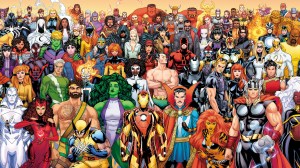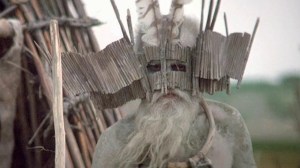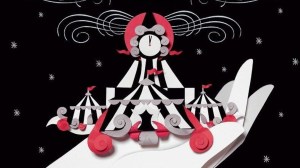Comic book movies and TV shows are the biggest trend in entertainment right now, with any series or film released under the umbrella of the “big two” superhero franchises (DC and Marvel) guaranteed to pull in a substantial audience. One of the biggest talking points surrounding the release of any comic book movie or TV series is no doubt the question of how closely (or not) the project is sticking to the comic book canon that inspired it.
Videos by ComicBook.com
A lot of people believe (pretty strongly) that comic book movies should stick to the canon, and that the only way to convey the core values of a character or story is by delivering a cinematic experience that fans are familiar with. Other fans are open to interpretation and new creative visions of the characters they know and love – even if that experimentation alters core values of the character.
But if you step back for a second and really look at comic books and their very nature, this shouldn’t even be a debate: Comic book movies and TV shows can – and should – alter canon, mythos, characters – really anything they want about a comic book property. And here’s why:
Comic Books Are About Change
From a literary standpoint, comic books are unique. It’s not just the format of having a story told in a combination of words and pictures measured out in boxes on a page; it’s also the fact that comic books, by their nature and tradition, are “butterfly novels – i.e., literary works meant to evolve over time by way of changing creative input.
Every comic book fan has a definitive version of the characters they love and read about, created by a specific creative team working in a specific era. Dan Jurgens’ Superman; Chris Claremont’s X-Men; Frank Miller’s Batman – each of these now well-known creator/character pairings marked a significant new direction for the character(s), pushing them into new eras and paradigms of storytelling and characterization. And the list of similar cases pretty much extends through the history of comic books.

If comic books can, by nature, change with the times and offer new creative interpretations of characters, what’s the rule that says comic book movies and TV shows can’t do the same? How can people like Suicide Squad director David Ayer or Batman v Superman director Zack Snyder by accused of “ruining” characters and canon, when they are simply the next to put their creative stamp on both?
If we’re playing by the rules of the comic book medium, then a film like Man of Steel, or Bryan Singer’s alternate version of X-Men mythos, are not just allowed but encouraged to exist, in the comic book tradition of new interpretation.
Change Does Not Equal Disaster
There’s this specious notion some fans have that when filmmakers or TV showrunners divert from comic book canon – or change any defining beat of a famous storyline or character – then it equals automatic disaster for the character and/or project. But of course, both the MCU and DCEU – and many other comic book shows in between – are littered with examples to the contrary.
The X-Men movies (even the ones you love) are all far departures from comic book canon; the DCEU films are clearly their own interpretation, but even the MCU has made many, many, changes, tweaks and updates to just about everyone of its characters – to the point of retroactively influencing the comics (read a great breakdown of that over on i09). Other successful comic book films – like Mark Millar and Matthew Vaughn’s collaborations on Kick-Ass and Kingsman: The Sercet Service – have similarly come with major overhauls to what was printed on the comic book page.

On the TV side, The Walking Dead still reigns as king, despite offering fans a very different path of events than the comics did. We just got done writing about why Gotham has struck such a successful chord as a mainstream comic book show, despite being a very distinct departure from Batman canon. Marvel’s network and Netflix shows have all made big changes to characters or lore – often with the enthusiastic approval of fans.
So clearly, not all change is bad. As recent history has shown, it’s often the changes fans don’t like that get marked as blasphemous, often at the expense of the creative minds behind said changes.
Changes Are Not Evidence of Ignorance
While we’re on the topic, let’s just put it out there: the filmmakers, actors, and TV showrunners get it (for the most part). There’s this insistent notion that any unpopular creative changes a comic book movie or TV show made must be the result of creators and executives who don’t “get” the core values of the character or the property.
However, in the modern (read: geek chic) age of comic book TV/movies, that’s a pretty hard argument to sustain. These days, it’s almost an official part of the PR process to to have directors, showrunners, actors, all taking to social media with pictures of the comics they’re reading as “research.”

Even actors who choose not to read the source material must navigate a continuous barrage of reporter and fan questions about the character’s source material, and characterization. In other words: knowing your sh*t about these comic book characters, their history, and the source material, is part of the job. Not just for performance sake onscreen, but also for the sake of marketing and promoting the movie (the important part).
Giving $200 million to those uneducated or ignorant about the characters and properties isn’t really a thing anymore. Not when there are entire universes to build.
All Opinions Fair & True
At the end of the day, it really boils down to preference: some interpretations of a comic book character or storyline will interest and delight you; others will definitely not. When comic book publishers make unfavorable changes to canon or characters, then fans may complain; they may ultimately stop reading for that creative run; but they rarely dismiss the character entirely, or boycott the idea of a new creative team trying to put their stamp on things.
For some reason, when it’s a single, big-budget movie that fans’ hopes are riding on, the rules change. Maybe it’s that fans look to the comic book page fore exploration and the movie or TV screen for validation that the characters and stories they know and love will be just as enjoyable to wider audience. But while that’s a nice sentiment, it’s not exactly a fair one.

TV showrunners, and movie directors, and all the actors and filmmaking teams that surround them, are creative people looking to put their creative stamp on comic book characters and stories that have been reinvented and re-told so many times, their histories turn Wiki pages into novels. Those working in the cinematic medium have just as much right as those on the page to try (succeed or fail) to inject new things into the characters and mythos, and possibly (hopefully) open up new doors of enjoyment for fans.
If not for those attempts, we wouldn’t have a Dark Knight Trilogy, or Guardians of the Galaxy, or Kick-Ass, Kingsman – or so many of the other comic book movies that the fanbase now holds in high regard.
So we should probably extend the same creative license to comic book movie and TV creators that we have always extended to comic book publishers and creative teams: let them try.
It won’t always work out

…Nothing to really explain here. We’ve all seen the failures (X-Men: Origins, Green Lantern); sometimes, going off book goes horribly, horribly, wrong.
But it doesn’t matter: some comic book creative runs are horrible (many, if we’re being honest); we have to allow new attempts at interpretation, regardless. Just the nature of the business.








